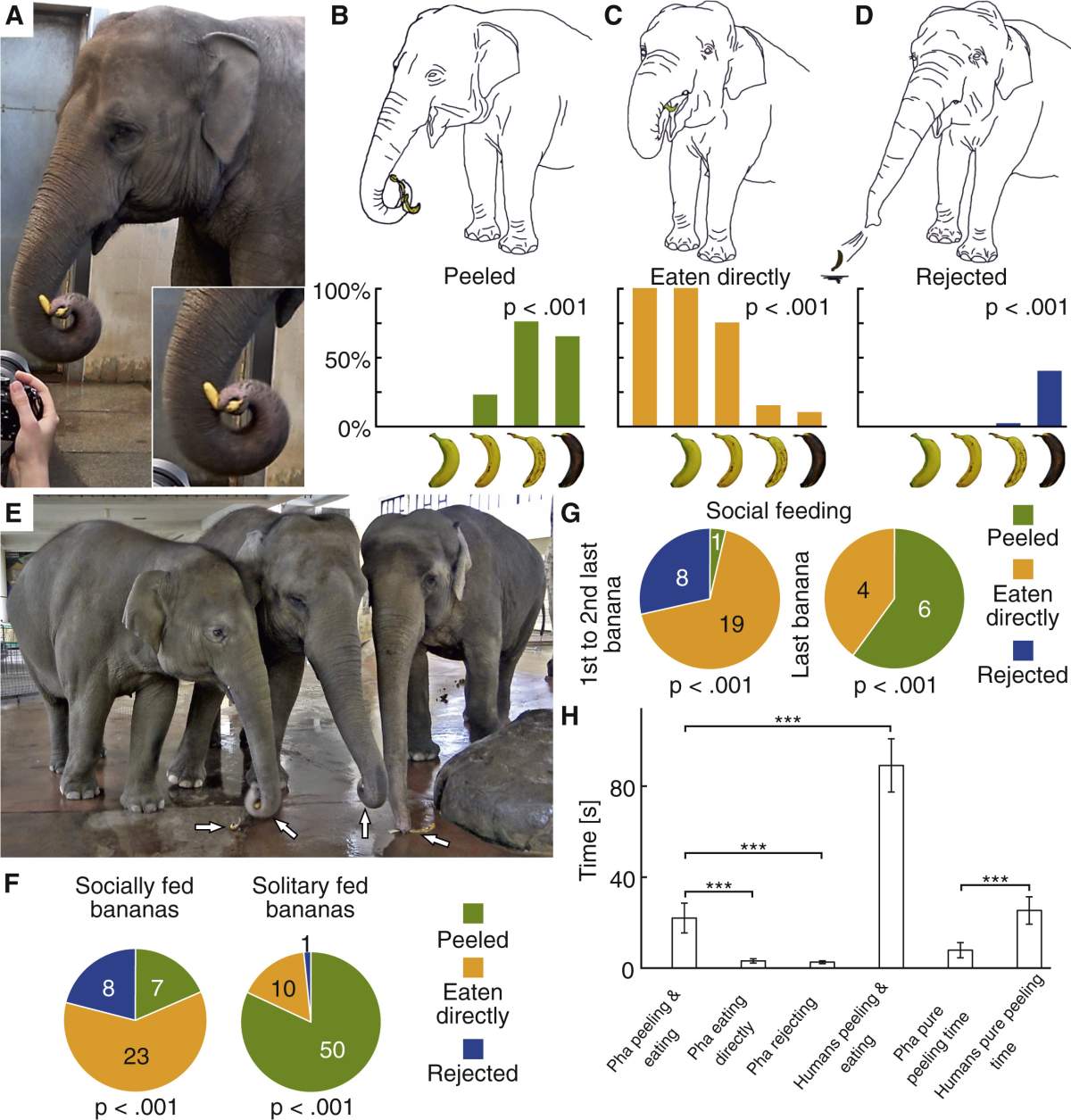A particularly savvy and dexterous elephant from the Berlin Zoo has grabbed the attention of scientists after demonstrating a rare, human-like behaviour: she can peel bananas.

Pang Pha, a middle-aged Asian elephant, is the focus of a new study in Current Biology that analyzed her banana-peeling behaviour and revealed that she’s a bit of a shy and picky eater.
Pha was brought to the Berlin Zoo as a baby in 1987. At the time, she was still being partially bottle-fed by her handlers and was treated as “the little princess of the caretakers,” according to Michael Brecht, a professor of neurobiology at Humboldt University and the senior author of the paper.
Her main caretaker consistently fed her peeled bananas, the paper states, and the handler would peel them directly in front of her. The researchers report that Pha was “never formally conditioned to peel bananas” but likely picked up the skill by observing her human caretakers.
The Berlin Zoo reached out to Brecht and his team and alerted them about their clever elephant, but when researchers arrived to observe her behaviour, they found it was hard to get Pha to consistently peel bananas.
“For weeks, we would bring the nicest banana we could find in Berlin to the zoo, and she would always just straight eat it,” Brecht told CNN. “There was some head scratching done. and we gradually figured out that it’s only brownish bananas that she peels. She never peels a beautiful yellow one.”
Researchers write that Pha’s “banana consumption patterns appeared random,” until they started categorizing the bananas they fed her by colour.
Yellow, unripe bananas were eaten as a normal elephant would, with Pha using her trunk to put the fruit in her mouth, peel and all. If the banana was too brown, she would pick it up with her trunk, then throw it to the side, uneaten.

Get breaking National news
Researchers learned that they could consistently get Pha to peel bananas when they offered her ripe, brown-speckled bananas: sweet and soft without being too squishy. She has refined taste, it seems.
Pha doesn’t open bananas like humans do, by peeling from the stem. Instead, she cracks the banana in half down the centre with her trunk then slams it on the ground to release the soft fruit inside. After shaking the peel off, she eats the banana.
Not only is Pha a picky eater, but she’s also shy to demonstrate her peeling skills in front of other elephants — though this may be because peeling takes her a couple of seconds and she’d much rather hoover up bananas in the presence of competition.
Researchers observed Pha being fed bananas in the same corral as other elephants and noticed she would eat “like a machine,” not wasting time to peel so she could snag more fruit. But when it came down to the last banana, 60 per cent of the time, Pha would save it and peel it.
As for why Pha peels bananas, researchers have no way of finding out definitively. It’s possible she prefers the taste of peeled bananas, but not enough to sacrifice her chances of eating more fruit. As for why she only peels yellow-brown bananas, it may have something to do with the ease of peeling the fruit at various stages of ripeness.
Pha is the only elephant at the Berlin Zoo who has demonstrated she can peel bananas. Pha has a daughter, Anchali, but it appears the skill hasn’t been passed down.
“The fact that Pang Pha’s daughter Anchali did not acquire banana peeling suggests that this skill is not easily transmitted by learning. Pha’s tendency to peel only when on her own might have limited possibilities for observational learning,” the paper states.
Another interesting tidbit the researchers learned: Pha can peel and eat a banana faster than humans, which demonstrates the remarkable trunk control elephants have. On average, Pha can peel a banana in eight seconds and it takes her 22 seconds to peel and eat the fruit.
“Elephants have outstanding trunk control and even make tools with their trunks. They have been shown to prepare tools to scratch themselves, repel insects, or block roads,” the paper states.
Pha isn’t the only elephant in the world who can peel bananas, the researchers write, citing anecdotal evidence from internet videos of elephants around the world demonstrating similar behaviour — but the ability is very rare.
An elephant can live over 80 years and its survival into old age depends on the animal’s ability to adapt to different environments and learn new things. As more and more elephants spend time with humans in zoos and conservation areas, it seems natural they would pick up some of our habits.












Comments
Want to discuss? Please read our Commenting Policy first.